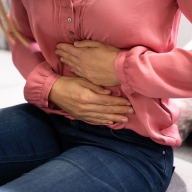10 Causes of Irregular Periods or Heavy Bleeding
Medically reviewed by
Dr. Joycelyn Schindler
McLeod OB/GYN Seacoast
A woman’s regular period (menstruation) can be troublesome but reflects a body that is functioning properly.
“A regular or normal period occurs 21-35 days apart with a flow lasting up to 7 days, requiring a change in pad or tampon no more than once an hour*,” says McLeod Gynecologist Dr. Joycelyn Schindler. “Several types of irregular periods can disrupt a woman’s life – inconsistent periods, heavy bleeding, missed menstruation. Common causes are cancer or cancer treatment, premature ovarian failure or hormone-based treatments. But the list includes many other causes.”
FIBROIDS
Muscle tissues growing into the wall of the uterus are mostly noncancerous but can cause heavy bleeding, extreme enough to cause anemia. Fibroids range in size from an apple seed to a grapefruit and trigger pain in the lower back, legs and pelvis.
ENDOMETRIOSIS
When bits of the uterine lining grow outside the uterus, the condition is called endometriosis. These stray cells could end up elsewhere, such as the ovaries or bowel, causing problems with a women’s period as well as cramping, pain or even infertility. With endometriosis, bitter cramps accompany heavy bleeding during periods and between periods, as well as causing prolonged periods.
PCOS
Polycystic Ovary Syndrome affects about 10% of women aged 15 to 44, causing multiple ovarian cysts and hormonal imbalances, which can lead to irregular periods. Women with PCOS have too much male hormone (androgen) in their system, which hinders normal menstrual cycles.
STRESS
Everyone feels stress at one time or another. When a woman experiences intense stress, her body floods with cortisol hormone. A cortisol excess restricts the body’s ability to generate the hormones needed for regular periods. The result is periods too frequently or missed periods due to abnormal ovulation.
THYROID
A 2015 study found that 44% of women with menstrual irregularities also suffered from thyroid disorders. In addition to helping stimulate your ovaries, thyroid hormones help control your appetite and energy. An underactive thyroid (hypothyroidism) causes heavier, longer periods, increased cramps, fatigue and weight gain. An overactive thyroid (hyperthyroidism) creates shorter periods along with sudden weight loss, anxiety and heart palpitations.
WEIGHT
Obesity impacts hormone and insulin levels, causing irregular periods. Yo-yo dieting and eating disorders, such as bulimia or anorexia nervosa, that leave a person with a Body Mass Index of less than 18.5 has the potential of creating hormonal havoc.
EXERCISE
Everyone needs moderate exercise to stay healthy and control our weight. However, too much exercise as experienced by long-distance runners or ballet dancers might cause a woman to stop having periods at all (amenorrhea).
ACTIONS YOU CAN TAKE
If you’re experiencing excessive or too little bleeding during your period or if you’re experiencing too many or too few periods, talk with your OB/GYN. As you can see from this list, there are many potential causes of irregular periods and your menstruation many not be the only effect of these problems.
Find a Gynecologist near you.
Sources include: McLeod Health, US Department of Health & Human Services, Prevention, Medical News Today, National Institutes of Health, American College of Obstetrics & Gynecology
-
McLEOD REGIONAL MEDICAL CENTER FLORENCE
843-777-2000 -
McLEOD DARLINGTON
843-777-1100 -
McLEOD DILLON
843-774-4111 -
McLEOD LORIS
843-716-7000 -
McLEOD SEACOAST
843-390-8100 -
McLEOD CHERAW
843-537-7881 -
McLEOD CLARENDON
803-433-3000



-
McLEOD REGIONAL MEDICAL CENTER FLORENCE
843-777-2000 -
McLEOD DARLINGTON
843-777-1100 -
McLEOD DILLON
843-774-4111 -
McLEOD LORIS
843-716-7000 -
McLEOD SEACOAST
843-390-8100 -
McLEOD CHERAW
843-537-7881 -
McLEOD CLARENDON
803-433-3000
 Find a Doctor
Find a Doctor  Locations
Locations  Services
Services 